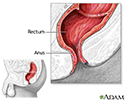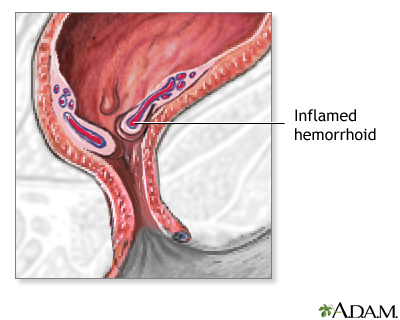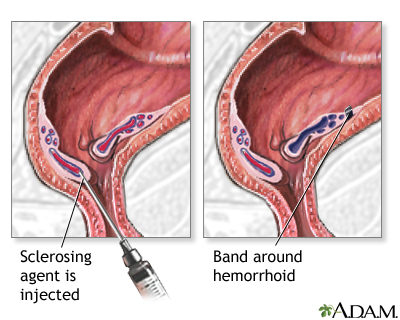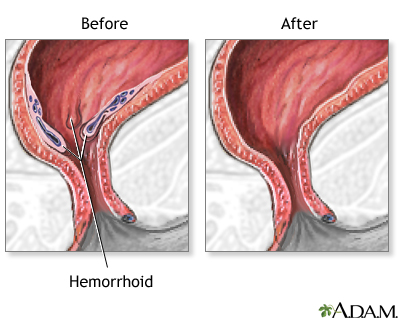Hemorrhoid surgery
Hemorrhoidectomy
Hemorrhoids are swollen veins around the anus. They may be inside the anus (internal hemorrhoids) or outside the anus (external hemorrhoids).
Hemorrhoids
Hemorrhoids are swollen veins in the anus or lower part of the rectum.

Often hemorrhoids do not cause problems. But if hemorrhoids bleed a lot, cause pain, or become swollen, hard, and painful, surgery can remove them.
Description
Hemorrhoid surgery can be done in your health care provider's office or in the hospital operating room. In most cases, you can go home the same day. The type of surgery you have depends on your symptoms and the location and size of the hemorrhoid.
Before the surgery, your doctor will numb the area so you can stay awake, but not feel anything. For some types of surgery, you may be given general anesthesia . This means you will be given medicine in your vein that puts you to sleep and keeps you pain-free during surgery.
General anesthesia
General anesthesia is treatment with certain medicines that puts you into a deep sleep so you do not feel pain during surgery. After you receive the...
Hemorrhoid surgery may involve:
- Putting a small rubber band around a hemorrhoid to shrink it by blocking blood flow.
- Stapling a hemorrhoid to block blood flow, causing it to shrink.
- Using a knife (scalpel) to remove hemorrhoids. You may or may not have stitches.
- Injecting a chemical into the blood vessel of the hemorrhoid to shrink it.
- Using a laser to burn the hemorrhoid.
Why the Procedure is Performed
Often you can manage small hemorrhoids by:
- Eating a high fiber diet
- Drinking more water
-
Avoiding
constipation
(taking a fiber supplement if needed)
Constipation
Constipation in infants and children occurs when they have hard stools or have problems passing stools. A child may have pain while passing stools o...
 ImageRead Article Now Book Mark Article
ImageRead Article Now Book Mark Article - Not straining when you have a bowel movement
When these measures do not work and you are having bleeding and pain, your doctor may recommend hemorrhoid surgery.
Risks
Risks for this type of surgery include:
- Bleeding
- Infection
- Leaking a small amount of stool (long-term problems are rare)
- Problems passing urine because of the pain
Before the Procedure
Several days before surgery, you may be asked to stop taking medicines that make it hard for your blood to clot. These medicines include:
- Aspirin
- Ibuprofen (Advil, Motrin)
- Naproxen (Aleve, Naprosyn)
- Warfarin (Coumadin)
- Clopidogrel (Plavix)
Be sure to tell your provider:
- What medicines you are taking, including over-the-counter medicines, supplements, or herbal remedies.
- About any cold, flu, fever, herpes breakout, or other illness you may have before your surgery.
On the day of your surgery:
- Follow your provider's instructions about when to stop eating and drinking.
- Take any medicines you are asked to take with a small sip of water.
- You will be told when to arrive at the hospital. Be sure to arrive on time.
After the Procedure
You will usually go home the same day after your surgery. Be sure you arrange to have someone drive you home. You may have a lot of pain after surgery as the area tightens and relaxes. You may be given medicines to relieve pain.
Follow instructions on how to care for yourself at home.
Instructions
You just had a procedure to remove your hemorrhoid. Depending on your symptoms, you may have had one of these types of procedures:Placing a small ru...
Outlook (Prognosis)
Most people do very well after hemorrhoid surgery. You should recover fully in a few weeks, depending on how involved the surgery was.
You will need to continue with diet and lifestyle changes to help prevent the hemorrhoids from coming back.
References
Chaudhry V, Abcarian H. Hemorrhoids. In: Cameron JL, Cameron AM, eds. Current Surgical Therapy . 11th ed. Philadelphia, PA: Elsevier Saunders; 2014:chap 53.
Hall JF. Hemorrhoids and hemorrhoidectomy. In: Delaney CP, ed. Netter's Surgical Anatomy and Approaches . Philadelphia, PA: Elsevier Saunders; 2014:chap 26.
Review Date: 4/5/2015
Reviewed By: Debra G. Wechter, MD, FACS, general surgery practice specializing in breast cancer, Virginia Mason Medical Center, Seattle, WA. Also reviewed by David Zieve, MD, MHA, Isla Ogilvie, PhD, and the A.D.A.M. Editorial team.





